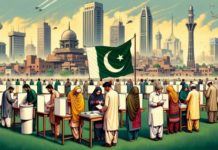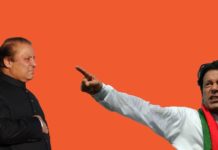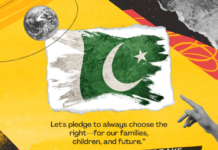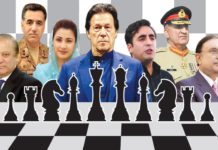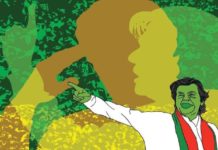Imran khan in cricketing fraternity was born in Sydney Cricket Ground in January 1977 against Australia during a memorable test match. Khan had been back in Pakistan after the completion of his education from Oxford University and representing county sides in the game. It was that time, when the decision was required. He had made his test debut five years earlier but the fast bowler he thrived to have become was still asleep in him. Cricket in the region he had spent his youth was rather conventional and utilitarian. Not to bowl fast, just be accurate. Don’t bat with improvisation. Don’t opt for an athlete like fitness. Just don’t. Not for the last time in his life, Khan had made his choice. Leaving the conventional methods behind: he was going to bowl really fast.

While shining the red-cherry
It took a while before things got in motion – there were certain elements that even he couldn’t control. English ways had an effect and stayed with him for a while. It remained with him till Sydney happened. In the first innings of Melbourne test and for, he was bowling English: medium, accurate, too gentle, and too flat. Young blood, not much happening and now dejected, he had decided in the second innings. The shackles had to break. He would storm in. At dangerous pace. That he did. Redemption!
Khan bagged 5 wicket haul at the mighty MCG in 2nd innings, seized 12 at Sydney (SCG), there he was terrifying – had enough pace that in the coming years, the golden era of very fast and daring bowling, Imran would be rated one of the fastest. Sydney gave the nation her most inspirational victory since Kardar and his boys triumphed in 1954. Imran rediscovered his career, which meant he rediscovered his cricketing life. That single cricket match changed the course of the game and the way it was played in Pakistan, a glimpse of it still remains with him. As it changed everything, perhaps it can be termed as the cricket match that transformed Pakistan.
The second tale I recall is “The Lost Semi-Final.” The year was 1987 and I wasn’t even born. That encounter with Australia marked his last international outing, at his home ground in Gadhafi Stadium Lahore, where Pakistan experienced a shock setback in the semi-final of the Cricket World Cup.
It was expected that Pakistan would go on to win the world cup because of conditions and home advantage. Resultantly Imran would receive a fairytale farewell. Instead, Pakistan lost. Imran played out of his skin – he struck thrice, waved his willow to the crowds with his half-ton, but still he and Pakistan fell short. Strategically, as skipper, he made one wrong call – by opting with Salim Gaffer to have a go in the last over. Imran could have asked Akram or could have save his own spell for the death overs. But, okay, other than through sub continental’s large colonial population. On each occasion when Imran galloped to bowl – and no lies, that mere sight was everything; how boys wished they could run and how girls desired Imran would run to them.
Coming from a sports loving family, they were in admiration and adulation of Imran. Cricket specifically was my father’s drug (sport largely was). As a normal itch of nationalism, of course, my family treasured a Pakistani like khan, highly respected around the globe and a high-flier. But we are Kashmiris – who migrated from Jammu(Riyasat) India during partition in 1947 and made Pakistan, mostly Sialkot, Karachi, home – Imran always had an angle of Karachi in him. This angle is vital, from which Muhajirs (Migrants) would be proud later, but in the world of his opposition, Karachi emerged as the first-born.
It was evident. Karachi never defined itself as Punjab. The metropolitan is referred to as nation’s financial soul but Lahore its beating heart. Karachiites always had an impression that athletes from the city were always overlooked. Therefore khan was always guilty of a fact that he was a Punjabi, and Pakistanis never bought the label of “Pathan fighter”. Cricketing fraternity of the city constantly had an opinion that Imran favored Lahoris over Karachi players. He didn’t.
Imran would opt out of a cricket tour or exhibition matches if the conditions were humid to play, or if the rivals came up with a weak side. And Karachi’s champion Miandad would lead. Imran at will would march back into the team such was the charisma and stature. He commanded such immense respect, governing over the sport like it was his land. His authority was such that during a team meeting of 92 World Cup that took place with an impression of a shooting crew killing a single unfortunate. After a relaxed massage session, towel around his waist, khan named 12 out of 16 probable the rest had to be put to a cricketing death. A fiction maybe, but really an imprint.
The ruling party of Karachi would bar Imran to enter the city decades later due to a bitter spat in light of a political row. This lasted for a brief period, anyhow: MQM enjoyed their share after associating an over-head towards the Karachi Cricket Stadium after Qasim Umar. Story behind it states, that Umar was a promising young batsman but lacked discipline, a natural case with most of talented young sport stars in Pakistan due to lack of education and grooming. However his stats didn’t warrant flyovers but political point scorings find their own place. During the Australia tour Qasim opted to speak in media about the issues in the dressing room. Unsurprisingly Imran butchered Qasim’s sporting career, but among karachiites the decision was unpardonable.
Imran made his comeback to international cricket after the request came in from Gen Zia. Moreover khan came across a pious man, mainly a spiritual figure – named Baba Chala – just after the 1992 world cup success. The meeting had an effect on Khan. Possibly this was the meet up that triggered Imran’s religious side a simple man who guided him towards a softer Islam. He would go on to win the cricket world cup of 92 but by then for him the glory was just another sporting achievement, the passion for the game had faded and he had become more… well, what was he not?
After the world cup triumph, he built a cancer hospital in memory of his mother who lost her battle to cancer, and with the attitude that the underprivileged mothers of his nation must not face the same fate, leisurely and gradually he bent towards Sufism. For the youth of Pakistan, the classy Khan, the ladies’ Imran, was a life goal. And with that global appeal was he even real?
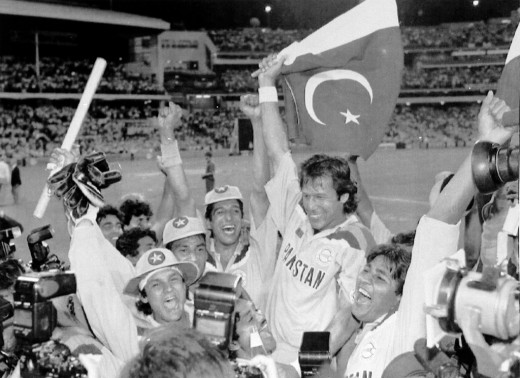
In the winters of 2010, I was 16, and I had started following Politics. Imran was now a politician, under the umbrella of politics – the rescuer of the Country.
Khan had bought a luxurious villa in Bani Gala, an isolated residential area in the country’s capital. If the word of mouth is to be believed it is equipped with breath-taking vintage architecture. I’m all ears to the tales that it is elegant and lovely. Imran had adopted a typical cultural wear since 1997, after forming Pakistan-Tehreek-Insaf. He was now a crusader of democracy. He had vastly nurtured the general public’s political bandwidth. Imran khan became Pakistani media’s favorite topic, he appeared on local channels frequently raising public issues, hassling, hectoring and arguing over national matters.
He was still struggling to be termed as a political stalwart. Imran was just months away from his political Sydney. That did happen, and with a bang. It was October 2011, at the Iqbal Park in Lahore with the sight of Pakistan Minaret (Minar-i-Pakistan) standing tall, after a political struggle spanning almost two decades and a series of relentless campaigning, a humongous gathering nearly 90,000 to 120,000 assembled. Incredible development. Just as Sydney left him astonished, so too this ocean of optimistic people left in our laps a charged Khan.
That day in 2010, he was still the same person who appeared on the political screen in 1997, still felt the same when he never wanted to be a politician. Just because he wasn’t really a political figure. PTI could manage to claim single seat in three general elections, Imran lacked, insincerity, cold-bloodedness and dishonesty – and all the vital traits that manufacture a Pakistani politician – to establish his initiative.
Imran had a philosophy to life and that was so Cold War. He maintained it throughout his political journey. He entered political arena because he saw Pakistan sinking. He was born in an era when Pakistanis were highly regarded and respected, he was from a generation who were first Pakistanis to be born in an independent country and they took massive pride in it.
Imran was fighting for a society that would be labeled as ‘Just’, country that ensures general public “financial and schooling impartiality”. Rather, the state was Elitist an. “Only guarantees success to a minor segment of elite class who bag all the assets”. Such a nation banishes the major segment and the prospects of a state are disastrous. Imran wanted to revert back to the core ideology for which Pakistan was created, the concept of social welfare state, a socio-democratic, Islamic country, integrating the concepts of Islamic social justice system.
It was so pleasing and admirable to witness Imran stood by exactly the identical thoughts as in his very first public talk when he opted to be a politician in 1997. Arguably another appreciable step of his was when he refused General Musharraf to become prime minister when offered (Musharraf however disagrees he ever offered the role). Furthermore another considerable remark was made by The Caravan magazine columnist Madiha Tahir, who specified that after US diplomatic leak through WikiLeaks: it stated “Imran speaks exactly what he expresses in public and in private life.”
By 2008, the Pakistani Taliban (Terrorist Organization) had slowly and gradually took control of whole Swat Valley in KPK due to criminal administrative ignorance. Additionally, there was political chaos, lawlessness, international and domestic issues, it struck like a bombshell that Swat was being lost. When situation was analyzed, and the valley was geographically close to the capital, Pakistan army launched an operation to take back control of the lost valley. During the armed battle, thousands of civil public were forcibly asked to move to refugee camps.
During the operation Khan visited one of the refugee camps, and he was dejected, he had witnessed the miserable condition of the public residing there. Imran was wretched like never before. He stated, on a media platform.
“Being paid in dollars from USA to butcher your own people? I cannot be a party to this, and I cannot comprehend that a selected corrupt mafia actually supports this barbaric acts of abduction and extortion just to be paid in US dollars?
“And when you stand against military actions being conducted against your own people you are labeled as Taliban Sympathizer, it hurts me that we have fallen to such lowest point of oppression.”
Now this was a complex solution to the problem. It wasn’t pleasing operating within her land. Armed conflict is always ugly. But most disheartening was the fact that mess was self-created. Swat operation wasn’t about military oppressing or slaughtering its own people, least of all for somebody else. Army was liberating them from an illegitimate and barbarous outside militants. Khan suggested table-talk, which, yes, is an honorable and a worthy stand, but to carry out negotiations were long over. Pakistan Army was not operating because they had to talk the Taliban out of Swat. Or out of their strategies – Taliban specified repeatedly – to take charge of the nation.
Imran had presented opposing views before, in differing variations to a specific depressive ruling towards women, he would time and again lash-out against deteriorating and informal Pak-US strategy of droning rebels. The “Taliban Khan” slogan attached to his character.
General public, a small segment though were supporting Imran, they backed his views. Had they found a new political skipper? Was he speaking straight to the heart and words were curling around and hitting the right chords in their head? Was he casting a spell with his words? Was he uttering the verses which could revolutionize a country? Not in 2010 perhaps

On 7th of May, 2013, I witnessed khan helpless and feeble. I was 19 and he was 61, on various media channels, he was hospitalized, grim and frail. Hospital staff had to give him support and care. He appeared wasted.
Imran had fallen 17 feet off from a container during a political campaign in Lahore. The very sight appeared scary, his supporters had to carry him through a packed gathering towards an ambulance, and it all appeared as if a dreadful bomb blast had took place. Imran recovered within few weeks but it could have been much worse.
Imran khan had now evolved in to a threatening political figure, popular among masses, and lastly, a statesman.
There was a significant change in him at political gatherings. As late as November 2009, he addressed general public like he was arguing in a talk show. It was civil. Yet in the year 2011, he appeared as if it was a different century, a different nation, under an altogether different and more charismatic leader.
It was 25th December 2011, during public gathering in Karachi (Mazar-e-Quaid) and thereafter, he was a show-stopper. Imran’s expression had found personality. Swiftly his voice could bite and reach out to millions. His words carried meaning. His speech became a dagger. Imran had learnt the art of facial expressions to showcase pain and agony. PTI introduced the culture of musical entertainment that twisted demonstrations into huge public gatherings, loud sit-ins. Khan would dance along. He synchronized his emotions and speech with a musical beat, taking a breather, recommencing, upholding and setting the tempo high.
Imran’s slogan about diminishing corruption, and a new revamped nation, were still intact but now they were reaching to the masses: PTI would eradicate corruption in 100 days! A tsunami of revolution is going to hit the corrupt! Imran termed it NayaPakistan (greater Pakistan) Transformation isn’t approaching, transformation is now, (Tabdeeli aa nahi rahi, Tabdeeli aa gayi hai) However, in the 2013 general elections, that did not exactly take place, but dejected, khan energetically molded the agony of election in to his advantage. He opted for mass public demonstrations against outcome of general elections which he termed as heavily fixed, Pakistan at large was at standstill – Imran ultimately persisted with election campaign without an election. Imran termed it as revolution. I didn’t agree, but millions within and out of Country did.
In 2012, some known, prominent names have started to join PTI. On the brink of 2018 general elections, Imran had had welcomed many more, In Pakistan they are called “electable”, representatives who are not guided by an ideology or values but they have a certain vote banks in their communities.
These individuals are a dilemma of politics in the country, moving among main political parties just when the wind blows. In 2007, a journalist had asked Imran about his stance on such politicians. Problematic. They are “beneficiaries of the status quo”, and the peruse politics “to safeguard self-interests”. “People who possess ideology are few and countable, who are willing to serve for a reason. Most of them have price-tags around their collar, they sell their allegiances.”
Imran shouldn’t have stated publically that he would not allow electable in PTI, eventually, those with- the price-tags, character-flaws, the switching devotions – became integral members of PTI. Imran had acknowledged that he required them to win. With this move he didn’t compromise on his political philosophy, though he now understood the world doesn’t revolve around his-self, it does outside of it. Imran had acknowledged that he needed to be a part of the system to change it.
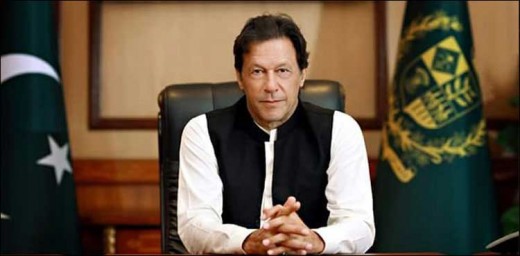
Prime Minister Imran Khan
Forty five years back when Sydney happened and Imran was born publicly, nobody can claim that who the actual khan is. Those who think they know, I’m all ears. From 1947 till date not even a single Pakistani has been a topic of debate as khan; biographies, memoires, personal accounts, journals, discussions, scandals, controversies and what not. Few have been on electronic media and in the print media as much, and I am still unable to figure out that who the actual khan is? He might be present somewhere within himself. Sometimes I contemplate that even at 66 the real khan is still unborn.
Months before the general elections 2018, Reham Khan, Imran’s ex-wife, published a book. In the memoir we get to know the play-boy English Khan still exists – However, there is twice the amount of playfulness. Women, men, lust and drugs. The leaked chapters made momentous headlines on social media and electronic media about khan’s isolated life, he was alleged guilty of consuming cocaine and that he parties the night away all alone, the mere thought of it is astonishingly silly, but would you deny it with definite assurance that Imran wouldn’t? I would not negate the authenticity of an account by an ex-Pakistani cricketer: khan in 1983, smoked local-weed in the changing room of the Gadhafi Stadium before taking the field and smashing India. Maybe I would like to believe it. The argument with Khan is that no such stuff is convincing and suddenly everything is convincing. Possibly, Reham’s idea was not to wreck his election campaign as much as Imran’s self-image, just by painting him as one of the reformists of Elitists he so derides.
With just 8 months of marriage, Reham believes she know Imran.
Imran’s 92 world cup companions believe they know him. The way he charged them, as he motivated them during the glorious campaign Inzimam and Wasim Akram with an emotional “cornered tigers” address. He asked them to deliver their best, and play like trapped tigers. And so they did, the finest sportsman nation had witnessed, in an hour of great need.
For decades Karachiites believed they know Khan. His political career was whitewashed after 2008 ban. In 2013’s general elections, PTI bagged a single seat in the metropolitan.
Now Karachi believes she know Imran: this time around PTI won 14.
If the massive hype behind his backing is to be believed – and from the chronicles of Pakistan’s military history, well? – The armed forces believe they know Imran. Perhaps, a little? And they would use him. Imran might allow foreign-policy and the matters of internal defense to them. Possibly, establishment might be of a view that Imran would govern with their strategy. Nevertheless, the military think-tanks would not have ignored the words he used persistently against the military-men of interfering in democratic system and by choosing few political leaders over others, the same allegation he is under now by his political rivals. I know for a fact that Pakistan’s establishment is not famous with their political judgments.
None of the above think wrong.
On 26th July, 2018 after the polling for general elections had ended Imran appeared on electronic media to deliver his unofficial victory speech. He sat in a room in his luxurious villa, wearing traditional national dress. The wrinkles on his face highlighted the struggle he had to go through. When Imran initiated his speech their appeared a man no one of us had known until then, and now the nation awaits for one final Sydney.



